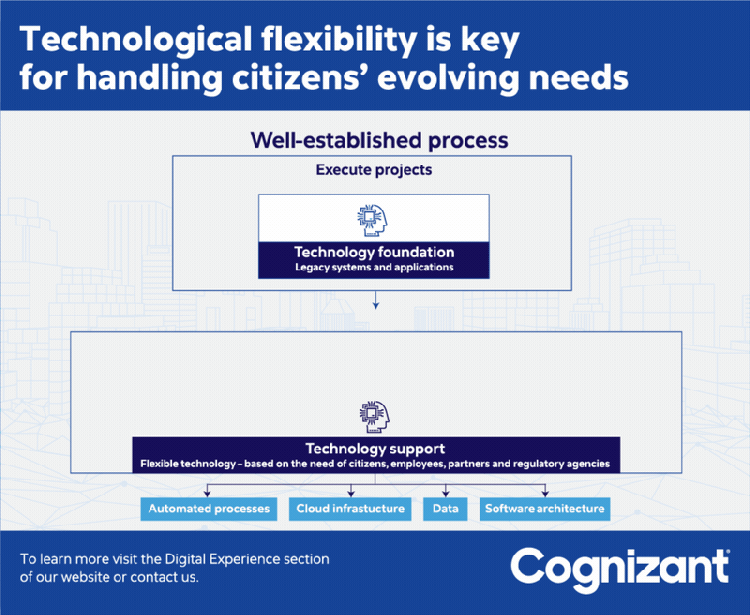
What's next for citizen experience? styles-h2 text-white
What's next for citizen experience?
Intimate Yet Industrialized
To be able to transform citizen experiences, government authorities need both intimacy and industrialization — it’s not either/or.
The science of intimacy starts with harnessing data from multiple touchpoints and sources to determine how citizens are doing. Contextualizing massive amounts of behavioral data with qualitative insights (i.e., service request data per channel, search data, engagement history data, support queries, service reviews, feedback, emotions, etc.) throughout the citizen journey allows decision makers to discover the "why" behind people's behavior. It helps to deliver a personalized experience, thus persuading citizens. The next step is to apply Agile design principles to generate, prioritize, test, iterate, and implement resulting ideas to understand what delights citizens the most.
One example: The Roads and Transport Authority (RTA) in the UAE captures the emotions of citizens from a variety of sources, such as social media, websites, applications, etc. It then analyzes the data using natural language processing (NLP) methods to identify customer needs. This shows decision makers where to focus improvement efforts, and identifies opportunities for developing new products and services.
Getting this right opens the door to industrialization — driving scale, speed and dexterity to quickly adapt to changing expectations at scale across contexts, channels and time is what we call “orchestration.” Industrialization is effected by connecting your organization’s datasets to customer touchpoints.
We recently engaged the biggest public procurement organization in Europe in accelerating a digital transformation plan that places the customer at the heart of every service it offers. After partnering with the client team, we captured and analyzed massive amounts of data (i.e., interactions, requests, personas, comments, complaints, etc.) to understand the “why” behind customers’ behavior. Then, our team developed a prototype and MVP with inputs from user research, service design, content design, technical architecture and development. Following Agile best practices, we then built a scalable and user-friendly platform, providing the client’s customers with a more informed and streamlined buying experience throughout their procurement journey, as well as reducing the cost, time and effort invested by its customers.
Fluid — Not Steady — by Design
Intelligent processes help organizations work faster and operate with greater agility for the express purpose of helping users get things done quickly and smoothly. Such processes need to be smart enough to act swiftly if something new needs to happen and to instantly communicate with involved parties.
To do this, organizations should orient processes around fresh inspiring journeys that simplify inherent complexity, and consistently embed data and insights — thereby creating systems of intelligence that proactively sense, learn and act, instantly. They should be dynamic and aware — built for purpose — and apply AI to rules-based systems to enhance operational decisions.
We recently engaged with a government-owned petrochemical company in the Gulf region that complained of disconnected systems and manual processes that prevented its existing systems from helping users work productively. It also suffered from poor process synchronization and complex manual operations; dynamic user requirements, especially within its supply chain operations, were hard to address.
After conducting a feasibility study of our solution, we integrated various ERP modules and solutions, coupled with our complete warehouse automation solution. We also developed blueprints for supply chain management, via extended warehouse management (EWM) from ERP and RFID solutions from other suppliers. As a result, our client achieved a 200% increase in plant efficiency after plant automation and a 30% increase in operational efficiency.
As the global pandemic revealed, we are not only technologically interconnected but interdependent. So are processes that involve people, technology and data; therefore, processes must become fluid by design and powered by data, insights and intelligence that allow government authorities and ecosystem players to be agile, fast and flexible.

Flexible to the Core, not Legacy
Technology should evolve in sync with citizens' changing demands and needs. Accordingly, government authorities need automated and intelligent processes to capture data and analyze it faster. This requires a flexible software architecture and infrastructure that is adaptable to the core and provides operational and strategic value to organizations while satisfying the needs of citizens.
As we’ve seen in multiple client engagements, cloud solutions are a critical component to a modern and adaptable IT foundation. However, the cloud is more than infrastructure. If correctly harnessed, it can help unleash and speed innovation and new ways of creating value. Furthermore, the cloud keeps organizations constantly aware and responsive at scale by providing access to organizational data and insights, and analytics in real-time via smartphones and devices.
One of our clients — a leading European financial markets regulator — wanted to automate its managed cloud services, comprising cloud and security operations, and sought support for applications hosted in its Amazon Web Services (AWS) environment. After assembling the right team and solution approach, we provided holistic support to over 60 instances of infrastructure as a service/platform as a service (IaaS/PaaS) in the AWS cloud environment, with a strong security underpinning, to eliminate blind spots. We then added a governance layer to oversee the managed services model and improvements in customer service and transformation activities. Additionally, we provided robust support for applications hosted on the AWS platform. As a result, our client achieved significant cost savings through flexible customer support and automation and a 19% improvement in first-level resolutions. Importantly, customers benefited from fast and seamless service delivery.
It is essential to have a willingness from the organization and ecosystem players to unlock cloud technology's benefits fully. Cloud service providers (i.e., Microsoft Azure, Google, AWS, etc.), in conjunction with software as a service (SaaS) application platforms, require proper orchestration to deliver on the needs of both government agencies, employees, third parties and, most importantly, the citizens.
